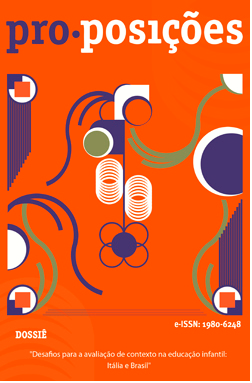Abstract
In contrast with the “human” or “post-human” theoretical assumptions concerning literature and its institutional place, this paper intends to establish a “negative” or “unproductive” reading of the teaching of literature. Therefore, the text is divided into two key moments: first, it examines the temporality that literature requires as a result of the effective contact with its objects; then, the essay approaches the process of “self-denial” that literature opens after the contact with the specificity of the artifacts. In short, defending a “negative” reading of literature does not mean emptying it of any ethical dimension; on the contrary, the “negativity” of the literary responds to an urgent political task for the present time.
References
Brasil (2006). Orientações curriculares para o ensino médio. Linguagens, códigos e suas tecnologias (Vol. 1). Brasília: Ministério da Educação, Secretaria de Educação Básica.
Candido, A. (2011). O direito à literatura. In A. Candido, Vários escritos (5a ed.). Rio de Janeiro: Ouro sobre azul.
Compagnon, A. (2009). Literatura para quê? (L. T. Brandini, Trad.). Belo Horizonte: Editora UFMG.
Durão, F. A. (2011). Teoria (literária) americana: uma introdução crítica. Campinas: Autores Associados.
Durão, F. A. (2015). Fragmentos reunidos. São Paulo: Nankin Editorial.
Eliot, T. S. (1989). Ensaios (I. Junqueira, Trad., introd. e notas). São Paulo: Art.
Engeplus. (2016). Colégio Leme promove teatro sobre livros do vestibular. Criciúma. Recuperado em 25 de maio de 2017, de http://www.engeplus.com.br/noticia/teatro/2016/colegio-lemepromove-teatro-sobre-livros-do-vestibular/.
Garrard, G. (2004). Ecocriticism. London & NewYork: Routledge.
Han, B.-C. (2015). Sociedade do cansaço (E. P. Giachini, Trad.). Petrópolis: Vozes.
Perrone-Moisés, L. (2016). Mutações da literatura no século XXI. São Paulo: Companhia das Letras.
Rabaté, D. (2013). Le temps de la relecture. Les Temps Modernes, 1(672), 184-190. doi:10.3917/ltm.672.0184.
Sibilia, P. (2012). Redes ou paredes: a escola em tempos de dispersão (V. Ribeiro, Trad.). Rio de Janeiro: Contraponto.
Todorov, T. (2009). A literatura em perigo (2a ed., C. Meira, Trad.). Rio de Janeiro: DIFEL.
Türcke, C. (2010). A sociedade excitada: filosofia da sensação (A. A. S. Zuin et al., Trad.). Campinas: Editora da Unicamp.
Wimsatt, W. K., & Beardsley, M. C. (2002). A falácia intencional. In L. C. Lima (Org.), Teoria da literatura em suas fontes (vol. 2, pp. 639-655). Rio de Janeiro: Civilização Brasileira.
Zilberman, R. (2016). A teoria da literatura nos bancos escolares. In A. Cechinel, O lugar da teoria literária (pp. 395-417). Florianópolis: EdUFSC; Criciúma: Ediunesc.
A Proposições utiliza a licença do Creative Commons (CC), preservando assim, a integridade dos artigos em ambiente de acesso aberto.


